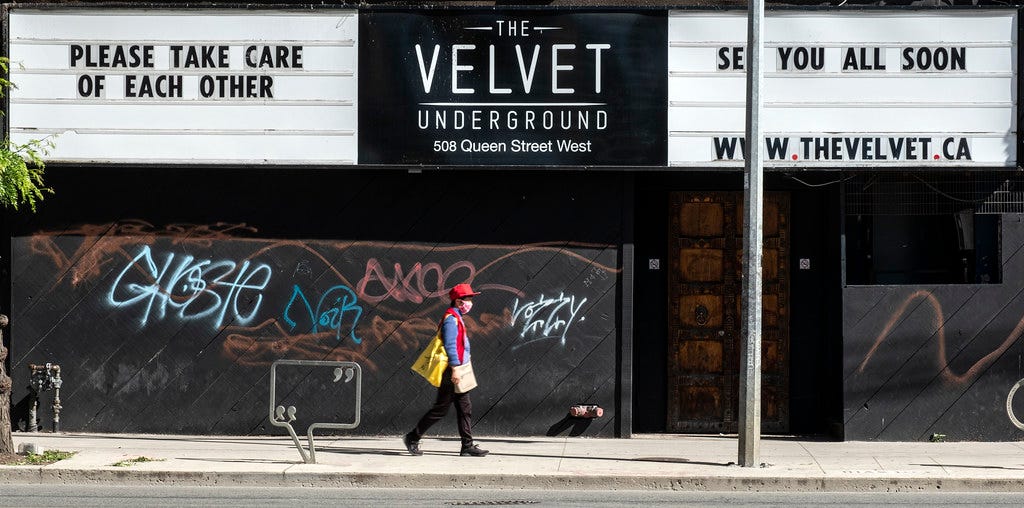Could the Velvet Underground closing be a good thing for live music in Toronto?
Live Nation's control is done, but the small venue could live on in another form
Goodbye Velvet Underground, we barely knew ye. Well, not exactly. This dingy nightclub on Toronto’s trendy Queen Street West was kind of my home away from home when I was in my twenties.
The Velvet, as it was affectionately known, was where my friends and I went to drink cheap beer, dance (poorly) to Nine Inch Nails and, in the early days, do some bowling on the single lane in the back. On a personal level, I knew it well.
But now it’s closed.
Maybe.
The venue announced last month via social media that it was shutting down at the end of October without much of an explanation, other than its lease was up and the “property will be returned to the owner for a new chapter.”
The Velvet itself effectively belonged to concert giant Live Nation, which acquired a majority stake in Toronto-based promoter and owner Embrace Presents in 2019.
Embrace’s crown jewel, as far as venues in the city were concerned, was the Danforth Music Hall and its capacity of 1,425. While the Velvet opened in the mid-1990s as an alternative-focused dance club (and erstwhile bowling alley), it was renovated into a dedicated 400-capacity music venue in 2016.
The acquisition was part of an ongoing strategy by Live Nation, which is now subject to a U.S. antitrust case that is seeking to break up the company for its dominance of the live music and ticketing business, to expand its ownership of venues across North America.
Aside from the Danforth Music Hall and the Velvet, Live Nation owns several major venues in Toronto, including the newly built Rogers Stadium (capacity 50,000), the Budweiser Stage (being renamed to RBC Ampitheatre, with a current capacity of 17,000), History (2,600), Opera House (800) and Mod Club (620).
Representatives at Live Nation did not return requests for comment. Several local concert promoters and industry insiders, who spoke on condition that their names not be used for fear of reprisals from the company, said Live Nation never really wanted the Velvet – that it was just a throw-in for the larger Danforth Music Hall.
“That’s a lot of the reason it closed,” said one, “but I think they also do too many all-ages shows in spaces that require bar sales to survive. I think we will see them get rid of a few things over the next five years. I don’t think it makes sense to them until you hit 1,000 tickets, when the facility fee makes up for the fact that the room is full of 12-year-olds.”
One other source said the Velvet wasn’t necessarily doomed as soon as Live Nation acquired control, but it was unlikely to succeed because the company isn’t used to managing such small venues.
“There was a world where it might have worked,” the source said.
So what happens next?
The property itself, at 508 Queen Street West, belongs to Toronto-based Liberty Entertainment Group, which owns or operates several restaurants and entertainment venues in the city. A spokesperson for the company said no decision has been made on what to do with the now-vacant space.
Much of the media coverage of the Velvet’s demise has lamented the continuing loss of live music venues in Canada’s biggest city, including recent closures of the Dakota Tavern, the Matador and Cold Tea Bar. But the stories haven’t considered the possibility that the Velvet may continue on in a different form, and that that could be good news – as far as competition goes – for the live scene.
“I’ve heard it may turn into a jazz or blues club,” said another promoter. “It’s not gone away. What’s gone away is Live Nation’s ownership of the venue.”
For more on Live Nation, be sure to tune into the Do Not Pass Go podcast this Monday where we’re chatting with Graham Wright, guitarist and keyboardist for Juno-nominated band Tokyo Police Club, about the dire state of the music business – and the company’s role in it.



